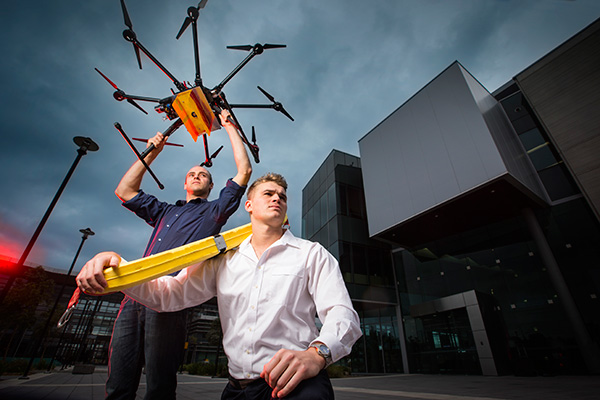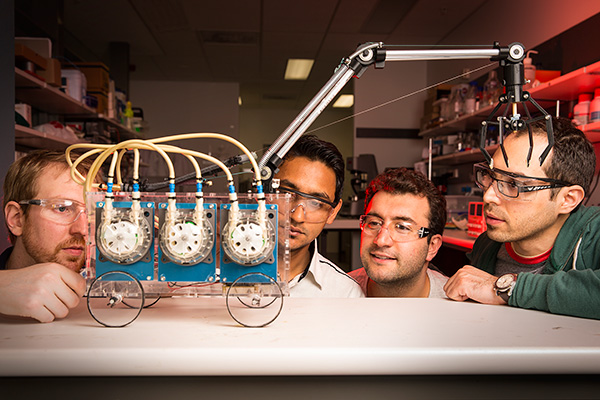September 2, 2014
Life-saving drones and artificial muscle cranes take out innovation competition
A drone that has the potential to save lives has won a student prototype competition held at UOW recently.

Innovation Works!, a collaboration between the Australian Institute for Innovative Materials and the Global Challenges Program, is a 10-week program that provides space, time and assistance to students to develop a prototype of a new product.
The team took out the top Innovation Works! prize, which saw them awarded $2000 and a place in UOW’s iAccelerate start-up initiative to further develop their prototype.
UOW PhD students Leo Stevens and Nicholas Roach (pictured above) are the brains behind the ‘Guardian Drone’, an invention that aims to provide a safer and faster way for lifesavers to assist swimmers in distress at sea.
With summer just around the corner, Mr Stevens said the drone, which drops a flotation device to swimmers in danger, would provide a lifesaver with valuable time in which to reach the swimmer without putting their own life at risk.
“I think the drone solves a real-world problem,” Mr Stevens said. “It has the potential to help lifeguards perform their jobs and to save lives.”
Another team developed a hydraulic crane, powered by artificial muscles, which won joint first prize. The inventors hope to use as an educational tool to motivate young students.
The crane combines a plethora of new technologies and is controlled via Bluetooth, using an Android app. A laser-cutting machine was used to create the crane while the joints were the product of 3D printing.
Inventor Danial Sangian, a UOW PhD student, said the crane could be used as an educational tool in primary and high schools, to demonstrate how artificial muscles work and expose children to the possibilities of engineering.

Reece Gately, Shazed Aziz, Danial Sangian and Sina Naficy invented a hydraulic crane, powered by artificial muscles.
Innovation Works! judge, Professor Geoffrey Spinks, said the aim of the competition was to provide an opportunity for students to develop an idea into a working prototype.
“When we set up the Innovation Works! student prototyping competition we were really just testing the water to see if there was any interest,” Professor Spinks, Manufacturing Innovation leader in the Global Challenges Program, said. “As judges, we were totally blown away by the sophistication of the concepts proposed and just how advanced the finalists progressed in such a short time.”
Media contact: India Lloyd, +61 488 456 050.